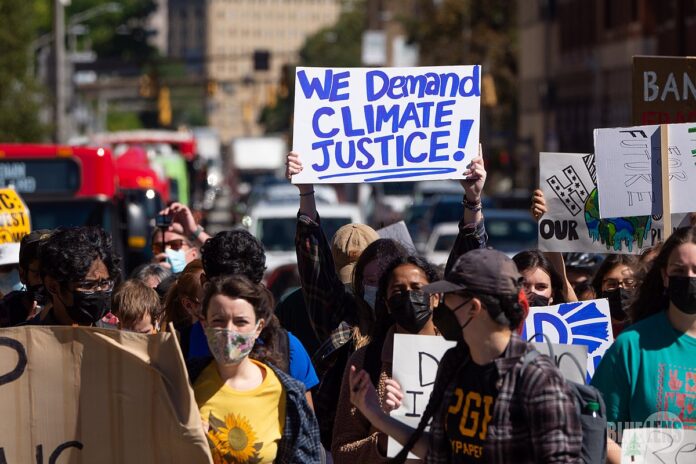
By
The NAACP has a long-standing history of fighting for climate justice. That’s because “environmental justice and civil rights are interconnected,” says Abre’ Conner, a Black woman and attorney who became the director of the NAACP Center for Environmental and Climate Justice in 2022.
“Civil rights are about understanding the interconnection of how Black folks or how other historically disadvantaged communities are disproportionately harmed as it relates to an issue that impacts us all,” Conner says.
She works alongside a small yet powerful team dedicated to acknowledging and combating environmental injustice. She informs and helps organize NAACP volunteers across the country, both on the state and local level, who are engaged on the ground in cities like Baltimore, Cleveland, and Jackson, Mississippi.
The water crisis in Jackson has been a major area of focus for the center. In August 2022, the water crisis in the 82% Black city of nearly 150,000 residents reached new heights, and there was a city-wide boil down order due to contaminated water.
ften talk about education, voter rights, and economic development, but the direct health implications of environmental and climate justice are just as important.
JEREMY ORR, DIRECTOR OF LITIGATION AND ADVOCACY AT EARTHJUSTICE
The NAACP’s climate justice activism in cities like Jackson has grown even more over the last 10 years. During his five-year term from 2008 to 2013, former NAACP president Ben Jealous’ founded the NAACP’s Climate Justice Program.
In 2012, the organization issued “Coal Blooded: Putting Profits before People,” a report that explored the impacts of coal-fired power plants on predominantly BIPOC and low-income communities.
Given that track record, it’s no wonder the NAACP still has volunteers on the ground in Jackson fighting for a better water infrastructure.
“We have been doing a lot of work in Jackson to try to help this predominantly Black city, and to rebuild its water infrastructure system. When they start to get resources to rebuild, you’ll have state legislators trying to pass a number of bills to take the money away that the federal government is now allotting to Jackson so they can rebuild,” Conner says.
“They’re doing this in a way that seems targeted to harm this majority-Black city that’s gone through decades and decades of disinvestment, but now that they finally have some resources to be able to rebuild.”
Prior to leading the center, Conner gained civil rights expertise working for the NAACP Legal Defense Fund, and the Center on Race, Poverty, and the Environment.
She was also an attorney representing migrant farm workers in the Central Valley against different environmental injustices. In law school, she focused her critical race theory paper on the intersection between civil rights and environmental issues.
Conner says her passion for the intersections between race and the climate crisis was a result of her parents educating her about civil rights at a young age. Both of Conner’s parents were active members of NAACP branches, which deeply impacted her worldview in regard to racial justice. They also raised in the African Methodist Episcopal Church, where she quickly learned that church can and should be a catalyst for civil rights conversations.
“My parents definitely were pivotal in how I view the world. I understand the experiences that I went through as a child and as a young adult in the larger narrative of racial justice and injustice.”
Civil rights are about understanding the interconnection of how Black folks or how other historically disadvantaged communities are disproportionately harmed as it relates to an issue that impacts us all.
ABRE’ CONNER, DIRECTOR OF THE NAACP CENTER FOR ENVIRONMENTAL AND CLIMATE JUSTICE
Jeremy Orr, the Director of Litigation and Advocacy at Earthjustice volunteers with the NAACP on a state level and is also the Environmental & Climate Justice Chair for the NAACP Michigan Area. On a day-to-day basis he sees the need for Conner’s leadership.
“We often talk about education, voter rights, and economic development, but the direct health implications of environmental and climate justice are just as important,” he says.
“I think it’s important to have a dedicated center run by somebody who’s dedicated to justice and our communities.”
As for Conner, she says she refuses to let Black experiences get erased from the climate movement.
“A lot of the conversations that we’re having about environmental inequities, while it does impact all of us, the people who are likely going to face the most harm are people who come from historically disadvantaged communities,” she says.
___
Related Article: Ben Jealous Is No Climate Justice Newbie


